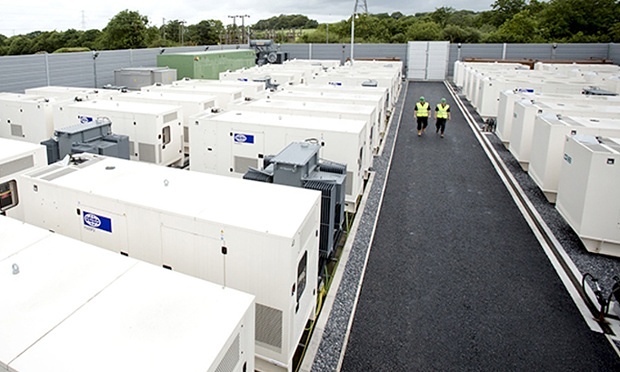Wealthy investors will earn millions from polluting diesel generators – and get lucrative tax breaks for doing so – under the government’s energy regime.
So-called “diesel farms” won contracts worth £175.5m to make power available to the National Grid as part of the capacity market auction that ended late on Thursday.
One of the major beneficiaries is Rockpool Investments, a private equity firm set up and chaired by former City fund manager Nicola Horlick, who is estimated to be worth £20m.
The National Grid contracts provide a guaranteed payment of more than £5m for standing ready to provide power when needed, with more payments made when they are called upon. On top of that income, the companies also qualify for tax relief that allows investors to slash their income tax bills.
Two of the diesel firms that won 15-year contracts to provide energy capacity from 2019 are Balance Power and Attune Energy. Both count Rockpool Investments among their major investors.
Rockpool’s website tells investors that both companies will operate “conventional diesel engines to provide standby power”. It says the projects will “qualify for tax reliefs under the Enterprise Investment Scheme”, or EIS.
Another section of the Rockpool website informs wealthy investors that EIS schemes “reduce your income tax bill by 30p for every £1 invested”. Investors also do not have to pay capital gains tax when they sell a stake in a project that qualifies under the scheme. Rockpool did not respond to a request for comment.
EIS’s stated mission is to “help smaller higher-risk trading companies to raise finance”.
Greenpeace’s chief scientist, Dr Doug Parr, said: “This new subsidy scheme has become a money spinner for wealthy individuals who are making a fast buck on polluting energy at the expense of bill payers and people’s health.
“Britain’s 21st-century economy deserves a flexible, modern, clean energy infrastructure, and what it gets is pop-up diesel farms and coal plants past their sell-by date. There’s an expanding void at the heart of the government’s energy policy, and these stopgap measures do very little to hide it.”
Horlick is also linked to another big winner from the diesel bonanza: the Plutus Energy chief executive, Phil Stephens. He is listed among Balance Power shareholders, while Plutus Energy has invested alongside Rockpool in Attune Energy.
Plutus Energy was awarded a separate contract to provide 20MW of capacity a year over the next 15 years, also using diesel generators. It is also understood to have qualified for EIS tax relief.
Dale Vince, the founder of green energy provider Ecotricity, lambasted a system that has handed new subsidies to diesel and extended funding for other fossil fuels.
“When the capacity market begins paying out, around a billion pounds a year will be added to household energy bills to subsidise old coal, old gas and dirty diesel generators – just to sit on standby,” Vince said.
“That’s more than is paid to support onshore windmills to actually supply over 5% of all electricity. And quite incredibly diesel engines also get a special 30% tax break. Why on earth that should be, perhaps only George Osborne knows.
“This comes in the same week that VAT on wind, solar and energy efficiency products is increased from 5% to 20%. Tax breaks for fossil fuels and more tax on renewables: that’s becoming the pattern of this government.”
Another of the big winners from diesel is Prime Energy Development, which succeeded with bids for seven diesel farms providing 20MW of power each over 15 years.
Prime Energy is jointly owned by Watt Power and international commodities group Noble, which has a majority stake. Watt Power’s website states that one of its directors, George Grant, who owns a 3.5% stake in the company, has “played a key role in working closely with the UK government to help create a regulatory environment which will underpin security of energy supplies and encourage new investment in both gas generation and gas storage”.
It goes on to say that he has helped advise the government on the right regulatory framework “to ensure lower carbon emissions”. A spokesman for the company said: “At no time has he had any official role within government in the direction or evolution of government energy policy.”
One of the biggest recipients of cash under the capacity market auction is PeakGen Power, which succeeded with 13 separate bids. PeakGen is majority owned by a company called Dione Holdings, the ultimate beneficiary of which is unknown because it is based in the low-tax jurisdiction of Malta.
Another shareholder is Mark Draper, the chief executive of PeakGen. The PeakGen website states: “We care passionately about the environment and have designed and operate our plants with the environment in mind.”
The company, which declined the opportunity to comment, adds that it plants woodland to offset any carbon emissions it creates.

